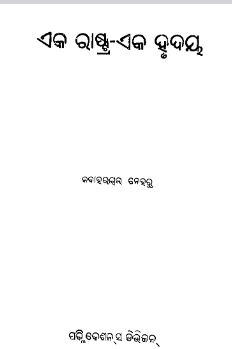Eka Rastra Eka Hrudaya is a significant essay book penned by Jawaharlal Nehru, the first Prime Minister of independent India. Originally published in 1964, this collection of essays explores the themes of national unity, communal harmony, and the eradication of racism and linguistic divisions as essential components of building a cohesive and inclusive nation.
Jawaharlal Nehru, a visionary leader and statesman, delves into the complexities of Indian society and polity in “Eka Rastra Eka Hrudaya,” offering profound insights and reflections on the importance of fostering a shared national identity that transcends barriers of race, language, and communalism.
Through a series of engaging essays, Nehru emphasizes the need for unity in diversity, advocating for the celebration of India’s pluralistic heritage while forging a common bond of brotherhood and solidarity among its diverse populations. His writings resonate with a spirit of inclusivity and compassion, urging readers to embrace tolerance, understanding, and mutual respect as the cornerstones of a harmonious society.
Nehru’s essays explore the perils of racism, both within India and on a global scale, highlighting the damaging effects of prejudice and discrimination on individual well-being and societal cohesion. He calls for a concerted effort to eradicate racist attitudes and behaviors, promoting empathy and equality as antidotes to divisiveness and bigotry.
In addressing the issue of language, Nehru delves into the intricate dynamics of linguistic diversity in India, celebrating the richness and beauty of the country’s myriad languages while advocating for the promotion of a shared national language as a unifying force. His essays underscore the power of language to bridge divides, foster communication, and strengthen the bonds of unity among citizens of a diverse nation.
Nehru’s reflections on communalism delve into the challenges posed by sectarianism and religious intolerance, urging societies to transcend narrow communal identities and embrace a spirit of secularism and pluralism. In “Eka Rastra Eka Hrudaya,” Nehru advocates for a secular and inclusive vision of nationhood, where individuals of all faiths and beliefs can coexist harmoniously within the framework of a democratic and egalitarian society.
“Eka Rastra Eka Hrudaya” emerges as a poignant meditation on the ideals of unity, love, and harmony that form the bedrock of a vibrant and inclusive nation. Nehru’s essays serve as a clarion call for embracing diversity, combating racism and communalism, and nurturing a collective ethos of compassion and solidarity that transcends divisions and fosters national cohesion.
In conclusion, “Eka Rastra Eka Hrudaya” encapsulates Jawaharlal Nehru’s profound vision of a united, diverse, and inclusive India, where the principles of equality, secularism, and unity form the cornerstone of a thriving democracy. Through his insightful essays, Nehru inspires readers to introspect on the values of tolerance, empathy, and social justice, encouraging a collective journey towards building a more equitable, compassionate, and harmonious society for all.
Books Info
| Books name | Eka Rastra Eka Hrudaya |
| Editor | Jawahar Lal Nehru |
| No Of pages | 56 |
| Publisher | Publication Subdibision |
| Publication | 1964 |
| Printed At | NA |
| Distributor | NA |

